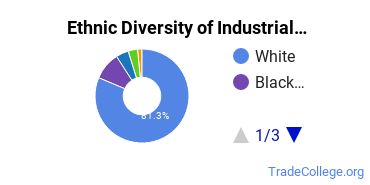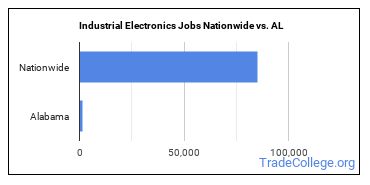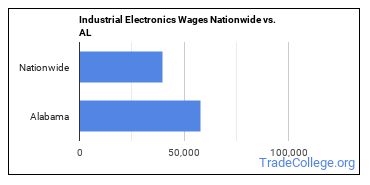Find Trade Colleges
Industrial Electronics Schools in Alabama
530 Industrial Electronics Technology/Technician students earned their degrees in the state in 2021-2022.
In this state, Industrial Electronics is the 9th most popular major out of a total 93 majors commonly available.
Featured schools near , edit
Education Levels of Industrial Electronics Majors in Alabama
Industrial Electronics Technology/Technician majors in the state tend to have the following degree levels:
| Education Level | Number of Grads |
|---|---|
| Award Taking Less Than 1 Year | 329 |
| Associate Degree | 170 |
| Award Taking 1 to 2 Years | 31 |
| Award Taking 2 to 4 Years | 31 |
Gender Distribution
In Alabama, a industrial electronics technology/technician major is more popular with men than with women.

Racial Distribution
The racial distribution of industrial electronics technology/technician majors in Alabama is as follows:
- Asian: 0.0%
- Black or African American: 10.0%
- Hispanic or Latino: 2.5%
- White: 83.6%
- Non-Resident Alien: 1.1%
- Other Races: 2.8%

Jobs for Industrial Electronics Grads in Alabama
1,470 people in the state and 85,250 in the nation are employed in jobs related to industrial electronics technology/technician.

Wages for Industrial Electronics Jobs in Alabama
Industrial Electronics Technology/Technician grads earn an average of $57,750 in the state and $39,810 nationwide.

Most Popular Industrial Electronics Programs in AL
There are 9 colleges in Alabama that offer industrial electronics technology/technician degrees. Learn about the most popular 9 below:
Of all the students who attend this school, 93% get financial aid. Students enjoy a student to faculty ratio of 18 to 1. Grads earn an average early-career salary of $32,112 after earning their degree at this institution.
Of all the students who attend this school, 93% get financial aid. A typical student attending Lurleen B. Wallace Community College will pay a net price of $7,116. Roughly six years after entering college, graduates of this school earn $26,614 a year.
This public college charges it's students an average net price of $8,017. Seeking financial aid? At this school, 77% of students receive it. Graduates earn an average $28,902 after graduation.
Seeking financial aid? At this school, 79% of students receive it. This public college charges it's students an average net price of $7,780. Roughly six years after entering college, graduates of this school earn $30,404 a year.
The student to faculty ratio is 17 to 1. Students who attend this public school pay an average net price of $5,820. Seeking financial aid? At this school, 99% of students receive it.
Of all the teachers who work at the school, 62% are considered full time. Students who attend this public school pay an average net price of $186. Students enjoy a student to faculty ratio of 12 to 1.
Seeking financial aid? At this school, 91% of students receive it. The student loan default rate of 4.30% is a good sign that graduates can afford their loan payments. In their early career, Central Alabama Community College grads earn an average salary of $26,667.
16 to 1 is the student to faculty ratio. This public school has an average net price of $3,232. The 3.80% student loan default rate is lower than average.
The student to faculty ratio is 17 to 1. 98% of students are awarded financial aid at this school. 49% of the teachers are full time.
Industrial Electronics Careers in AL
Some of the careers industrial electronics technology/technician majors go into include:
| Job Title | AL Job Growth | AL Median Salary |
|---|---|---|
| Industrial Equipment Electrical and Electronics Repairers | 3% | $58,270 |
| Semiconductor Processors | 0% | $0 |
Explore Major by State
Alabama
Arkansas
Connecticut
Florida
Idaho
Iowa
Louisiana
Massachusetts
Mississippi
Nebraska
New Jersey
North Carolina
Oklahoma
Rhode Island
Tennessee
Vermont
West Virginia
View Nationwide Industrial Electronics Report
References
More about our data sources and methodologies.

